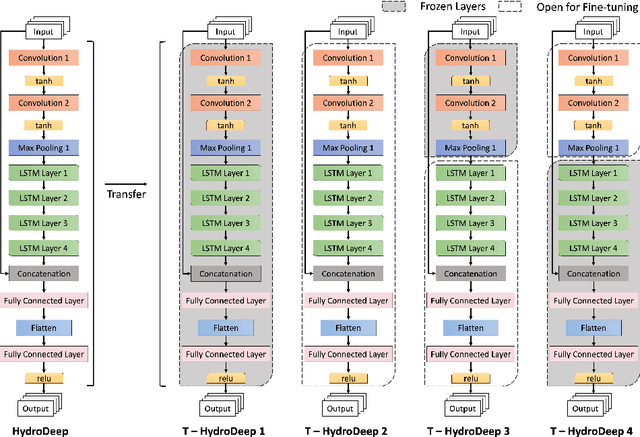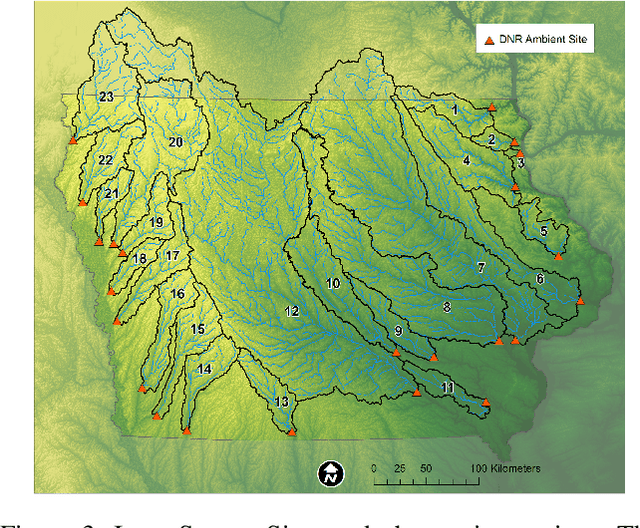Chaoqun Lu
Accelerating Domain-aware Deep Learning Models with Distributed Training
Jan 25, 2023Abstract:Recent advances in data-generating techniques led to an explosive growth of geo-spatiotemporal data. In domains such as hydrology, ecology, and transportation, interpreting the complex underlying patterns of spatiotemporal interactions with the help of deep learning techniques hence becomes the need of the hour. However, applying deep learning techniques without domain-specific knowledge tends to provide sub-optimal prediction performance. Secondly, training such models on large-scale data requires extensive computational resources. To eliminate these challenges, we present a novel distributed domain-aware spatiotemporal network that utilizes domain-specific knowledge with improved model performance. Our network consists of a pixel-contribution block, a distributed multiheaded multichannel convolutional (CNN) spatial block, and a recurrent temporal block. We choose flood prediction in hydrology as a use case to test our proposed method. From our analysis, the network effectively predicts high peaks in discharge measurements at watershed outlets with up to 4.1x speedup and increased prediction performance of up to 93\%. Our approach achieved a 12.6x overall speedup and increased the mean prediction performance by 16\%. We perform extensive experiments on a dataset of 23 watersheds in a northern state of the U.S. and present our findings.
Transfer Learning Approaches for Knowledge Discovery in Grid-based Geo-Spatiotemporal Data
Oct 02, 2021

Abstract:Extracting and meticulously analyzing geo-spatiotemporal features is crucial to recognize intricate underlying causes of natural events, such as floods. Limited evidence about hidden factors leading to climate change makes it challenging to predict regional water discharge accurately. In addition, the explosive growth in complex geo-spatiotemporal environment data that requires repeated learning by the state-of-the-art neural networks for every new region emphasizes the need for new computationally efficient methods, advanced computational resources, and extensive training on a massive amount of available monitored data. We, therefore, propose HydroDeep, an effectively reusable pretrained model to address this problem of transferring knowledge from one region to another by effectively capturing their intrinsic geo-spatiotemporal variance. Further, we present four transfer learning approaches on HydroDeep for spatiotemporal interpretability that improve Nash-Sutcliffe efficiency by 9% to 108% in new regions with a 95% reduction in time.
HydroDeep -- A Knowledge Guided Deep Neural Network for Geo-Spatiotemporal Data Analysis
Oct 09, 2020



Abstract:Floods are one of the major climate-related disasters, leading to substantial economic loss and social safety issue. However, the confidence in predicting changes in fluvial floods remains low due to limited evidence and complex causes of regional climate change. The recent development in machine learning techniques has the potential to improve traditional hydrological models by using monitoring data. Although Recurrent Neural Networks (RNN) perform remarkably with multivariate time series data, these models are blinded to the underlying mechanisms represented in a process-based model for flood prediction. While both process-based models and deep learning networks have their strength, understanding the fundamental mechanisms intrinsic to geo-spatiotemporal information is crucial to improve the prediction accuracy of flood occurrence. This paper demonstrates a neural network architecture (HydroDeep) that couples a process-based hydro-ecological model with a combination of Deep Convolutional Neural Network (CNN) and Long Short-Term Memory (LSTM) Network to build a hybrid baseline model. HydroDeep outperforms the performance of both the independent networks by 4.8% and 31.8% respectively in Nash-Sutcliffe efficiency. A trained HydroDeep can transfer its knowledge and can learn the Geo-spatiotemporal features of any new region in minimal training iterations.
 Add to Chrome
Add to Chrome Add to Firefox
Add to Firefox Add to Edge
Add to Edge